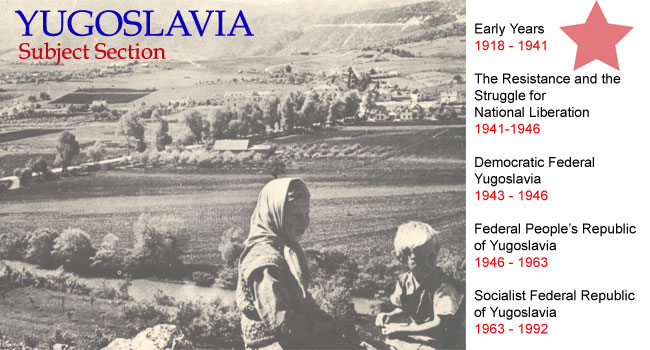
The Resistance and the Struggle for National Liberation
1941 - 1946
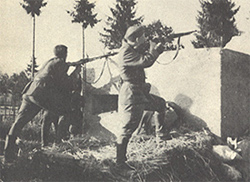 Following the German invasions of Yugoslavia and the USSR, the Yugoslav people mobilized a large a partisan army to repel the occupying forces. The partisan resistance was organized and led by Josip Broz Tito and the Communist Party of Yugoslavia. Following their victory over the German occupiers, the people of Yugoslavia refused to re-establish the rule of monarchy under the exiled King Peter. The Federal People's Republic of Yugoslavia was founded and Tito was elected president of the nation shortly thereafter.
Following the German invasions of Yugoslavia and the USSR, the Yugoslav people mobilized a large a partisan army to repel the occupying forces. The partisan resistance was organized and led by Josip Broz Tito and the Communist Party of Yugoslavia. Following their victory over the German occupiers, the people of Yugoslavia refused to re-establish the rule of monarchy under the exiled King Peter. The Federal People's Republic of Yugoslavia was founded and Tito was elected president of the nation shortly thereafter.
Oath Taken by Fighting Men of Partisan Detachments
Survey of the People's Liberation War by Colonel Fabijan Trgo
It has been necessary to shed floods of precious national blood, it has been necessary that tens of thousands of the nation's finest sons lay down their lives in the course of two years' unequal struggle with the enemy, that in the end the truth about the actual situation in Yugoslavia might hew its way through to the world. Never before perhaps has a small nation paid such a high price to convince the world that the blood which has been shed in Yugoslavia is its own blood…The struggles of our peoples and the brilliant successes which they have achieved on the field of battle…have created all the conditions necessary that our peoples may succeed in realizing their aspiration-a free, truly democratic, fraternal, federal Yugoslavia.
—Josip Broz Tito
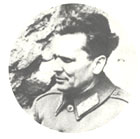 Josip Broz Tito (1892 -1980)
Josip Broz Tito (1892 -1980)
Tito organized and led the partisan resistance in Yugoslavia during World War II. He was elected Prime Minister of Yugoslavia in 1945 and in 1974 he was named President for life, a position he held until his death in 1980. (Full biography)
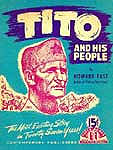 Tito and His People
Tito and His People
A chronicle of the Yugoslav resistance, including a biographical sketch of Josip Broz Tito and information regarding the history of Yugoslavia through the eyes of American author Howard Fast. First published in 1944.
Maps of Yugoslavia from the Partisan Resistance era
Dismemberment of Yugoslavia by Germany, Italy and their allies in April 1941 562 K
Liberated and semi-liberated territory at the end of 1942 438 K
Maps from Tito: Selected Military Writings, Vojnoizdavčki Zavod, Belgrade, 1966
Writings from the People's Federal Republic of Yugoslavia
(1946-1963)
Peace
and Greece Ales Bebler (October 1948)
Speech of Dr. Ales Bebler, Deputy Minister of Foreign
Affairs and Acting Chief of the Delegation of the F.P.R. of Yugoslavia to the
Third Session of the General Assembly of the United Nations. Delivered before
the First Committee of the General Assembly on October 27, 1948.
Communism and Fatherland by Boris Ziherl (1949)
Writings from the Socialist Federal Republic of Yugoslavia
(1963-1992)
Socialism in Theory and Yugoslav Practice - Collection of Conferences | Le socialisme dans la théorie et la pratique yougoslave - Recueil des conferences, International University Center for Social Sciences, University of Belgrade (1969-1976)
Self-Management in Yugoslavia
Workers Manage Factories in Yugoslavia by Marshal Tito (1950)
Branko Pribićević Archive Pribićević was one of the most prominent political scientists in the former Yugoslavia. His PhD thesis was published in 1959 as The shop stewards’ movement and workers’ control 1910-1922.
The Praxis Group

A Marxist-humanist journal which stressed the significance of the early humanists writings of Marx and pleaded for a creative adaptation of Marxism in the context of Yugoslav self-management.
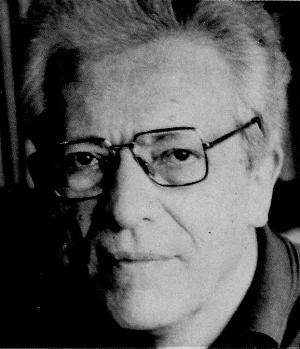 Gajo Petrović Archive One of the main theorists in the Praxis Group and long-time editor of the journal Praxis, Petrović was one of the leaders of the Yugoslav critique of Stalinist philosophical ideas after the early 1950s. His philosophical views evolved towards an interpretation of Marxism based on the philosophical works of the young Marx.
Gajo Petrović Archive One of the main theorists in the Praxis Group and long-time editor of the journal Praxis, Petrović was one of the leaders of the Yugoslav critique of Stalinist philosophical ideas after the early 1950s. His philosophical views evolved towards an interpretation of Marxism based on the philosophical works of the young Marx.
Trotskyist Writings on Yugoslavia
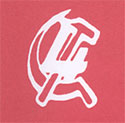 Letter to Yugoslav Comrades L.D. Trotsky (October 10, 1920)
Letter to Yugoslav Comrades L.D. Trotsky (October 10, 1920)
Discussion On Yugoslavia & The Tito-Stalin Split 1947-1951
On the Class Nature of the "People's Democracies" Tony Cliff
(July 1950)
Stalin's Satellites in Europe Tony Cliff (1952)
First Balance Sheet of the Yugoslav Affair Ernest Mandel (July 1951)
On the Workers and Peasants Government Ernest Mandel (April 1984)
Writings of Michel Pablo
The Yugoslav Affair (August 1948)
Evolution of Yugoslav Centrism (October 1949)
Yugoslavia and Permanent Revolution (January 1950)
Anarchist Writings on Yugoslavia
Birth of a Revolutionary Movement in Yugoslavia Fredy Perlman (1969)
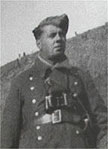 Enver Hoxha on Tito
Enver Hoxha on Tito
“After many patient efforts to bring the renegade Tito into line, when they were convinced he was incorrigible, Stalin, the Bolshevik Party and all the other genuine communist parties of the world unanimously condemned him.”
-- from With Stalin: Memoirs from My Meetings with Stalin
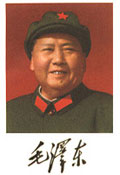 Maoist Critiques of Tito and
Yugoslavian Communism
Maoist Critiques of Tito and
Yugoslavian Communism
“Tito specialized in being disappointed. His energy belongs to that side. The Moscow Declaration is the strength of our side. The Yugoslavia program checks the ambition of the proletariat and encourages the arrogance of the enemy.”
-- from Speeches At The Second Session Of The Eighth Party Congress
by Mao Zedong, May 8-23, 1958
Music
The Internationale (Serbo-Croatian) 767K mp3 file
Hej Sloveni ("Hey Slavs" - National Anthem of Yugoslavia) 937K mp3 file
Lenka by Kočo Racin (performed by Zafir Hadzimanov) 1.5MB mp3 file Lyrics
 |
| Kočo Racin |
Kočo Racin (22 December 1908 - 13 June 1943) was a Macedonian poet who is considered to be the founder of modern Macedonian literature. He was also one of the leading Communists in the Republic of Macedonia in the period between the two world wars. In the second half of 1933 he was member of the Land Committee of the Communist Party of Yugoslavia for Macedonia. In the beginning of 1934 he was captured by the police and sentenced to prison. He was imprisoned until December 1935. During World War II, Racin joined the ranks of the National Liberation Army. He was killed on Lopushnik Mountain in 1943 by his comrades in arms, most probably by mistake.
Racin wrote his major work, "Beli mugri" ("White downs"), in 1939 and "Lenka" is a song from this collection.
Comments, contributions or questions are welcomed.
Contact this Archive’s Administrator